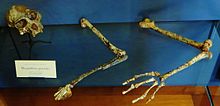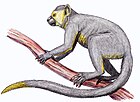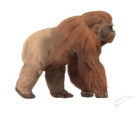Mesopithecus
| Mesopithecus Temporal range:
| |
|---|---|

| |
| Skeleton | |

| |
| Life restoration of Mesopithecus pentelicus from Zhaotong, China by Mauricio Antón | |
| Scientific classification | |
| Domain: | Eukaryota |
| Kingdom: | Animalia |
| Phylum: | Chordata |
| Class: | Mammalia |
| Order: | Primates |
| Suborder: | Haplorhini |
| Infraorder: | Simiiformes |
| Family: | Cercopithecidae |
| Subfamily: | Colobinae |
| Genus: | †Mesopithecus Wagner, 1839 |
| Species | |
| |
Mesopithecus ("middle monkey" for being between Hylobates and Semnopithecus in build) is an extinct genus of Old World monkey belonging to the subfamily Colobinae that lived in Europe and Asia during the Late Miocene and Pliocene epochs, around 8.2-2.6 million years ago.[1][2][3] Fossils span from Great Britain and the Iberian Peninsula in the west, eastwards to the Indian Subcontinent and China.[2] Species of Mesopithecus had a body length of about 40 centimetres (16 in), possessing a slender body with long, muscular limbs and flexible fingers.[4] Analysis of its anatomy suggests that members of the genus were semiterrestrial, spending a considerable amount of the time on the ground,[5][6] though some authors have argued that some species were likely arboreal.[7] Species of Mesopithecus were likely capable climbers and probably occasionally engaged in leaping.[2] Dental microwear analysis suggests that it fed on hard seeds as well as probably leaves.[8][9] The relationship of Mesopithecus to living members of Colobinae is uncertain, some have interpreted it as an early offshoot outside the split between Asian and African colobines, while others have interpreted it as a close relative of the Asian doucs (Pygathrix).[10]
Gallery
[edit]-
Mesopithecus pentelici skulls
-
Skeletal restoration
References
[edit]- ^ Xueping Ji, Dionisios Youlatos, Nina G. Jablonski, Ruliang Pan, Chunxia Zhang, Pei Li, Min Tang, Tengsong Yu, Wenqi Li, Chenglong Deng, Song Li (2020). "Oldest colobine calcaneus from East Asia (Zhaotong, Yunnan, China)". Journal of Human Evolution. 147 (102866). Bibcode:2020JHumE.14702866J. doi:10.1016/j.jhevol.2020.102866. PMID 32862123.
{{cite journal}}: CS1 maint: multiple names: authors list (link) - ^ a b c Jablonski, Nina G.; et al. (6 August 2020). "Mesopithecus pentelicus from Zhaotong, China, the easternmost representative of a widespread Miocene cercopithecoid species". Journal of Human Evolution. 145: 102851. Bibcode:2020JHumE.14602851J. doi:10.1016/j.jhevol.2020.102851. PMID 32771770.
- ^ Eronen, Jussi T.; Rook, Lorenzo (November 2004). "The Mio-Pliocene European primate fossil record: dynamics and habitat tracking". Journal of Human Evolution. 47 (5): 323–341. doi:10.1016/j.jhevol.2004.08.003.
- ^ Palmer, D., ed. (1999). The Marshall Illustrated Encyclopedia of Dinosaurs and Prehistoric Animals. London: Marshall Editions. p. 289. ISBN 1-84028-152-9.
- ^ Youlatos, Dionisios; Koufos, George D. (January 2010). "Locomotor evolution of Mesopithecus (Primates: Colobinae) from Greece: evidence from selected astragalar characters". Primates. 51 (1): 23–35. doi:10.1007/s10329-009-0161-2. ISSN 0032-8332.
- ^ Bogdanova, Ralitsa; Youlatos, Dionisios; Spassov, Nikolai (July 2023). "Terrestriality as reflected in the humerus of Mesopithecus delsoni (Cercopithecidae, Colobinae) from Hadjidimovo, Bulgaria". Journal of Human Evolution. 180: 103383. doi:10.1016/j.jhevol.2023.103383.
- ^ Escarguel, Gilles (August 2005). "Mathematics and the Lifeway of Mesopithecus". International Journal of Primatology. 26 (4): 801–823. doi:10.1007/s10764-005-5324-4. ISSN 0164-0291.
- ^ Merceron, Gildas; Scott, Jessica; Scott, Robert S.; Geraads, Denis; Spassov, Nikolai; Ungar, Peter S. (December 2009). "Folivory or fruit/seed predation for Mesopithecus, an earliest colobine from the late Miocene of Eurasia?". Journal of Human Evolution. 57 (6): 732–738. doi:10.1016/j.jhevol.2009.06.009.
- ^ Thiery, Ghislain; Gillet, Geoffrey; Lazzari, Vincent; Merceron, Gildas; Guy, Franck (November 2017). "Was Mesopithecus a seed eating colobine? Assessment of cracking, grinding and shearing ability using dental topography". Journal of Human Evolution. 112: 79–92. doi:10.1016/j.jhevol.2017.09.002.
- ^ Alba, David M.; Montoya, Plini; Pina, Marta; Rook, Lorenzo; Abella, Juan; Morales, Jorge; Delson, Eric (November 2015). "First record of Mesopithecus (Cercopithecidae, Colobinae) from the Miocene of the Iberian Peninsula". Journal of Human Evolution. 88: 1–14. doi:10.1016/j.jhevol.2015.08.003.
External links
[edit]- "Rare Mesopithecus skull unearthed in Chalkidiki". Anaweb. Archived from the original on 2006-10-07.






